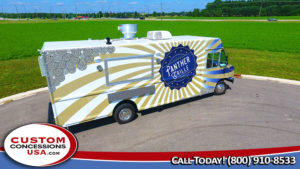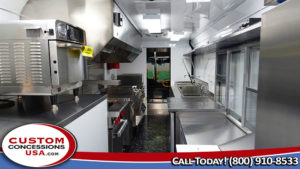
There are many differences between food trucks and sit-down restaurants, and we’re going to be going over four of those differences below.
If you’re thinking about joining the food truck industry in the near future with your first food business, then we encourage you to take some of the below points to heart … and we also will say the same thing to restaurant franchise owners who are looking to expand with a mobile kitchen business.
The Main Differences Between Food Trucks And Sit-Down Restaurants
- Food Trucks Are Mobile
- The Cost
- The Flexibility Of Food Trucks
- Food Trucks Aren’t As Big, Which Means Many Different Things
4.) Food Trucks Are Mobile
This is one of the main differences, to say the least. Since food trucks are mobile, food truck owners don’t have to rely on one location to make all of their sales.
If a location doesn’t work out for whatever reason, then an owner can simply find a different one, and many owners travel to multiple locations on a weekly basis.
With a sit-down restaurant, you have to find one perfect location because your business is stuck … unless you want to open up another location or move, and both avenues can cost a lot of money.
Being mobile means food trucks can also go to events and catering jobs with ease, especially since all of the food and equipment goes right inside the food truck.
3.) The Cost
Food trucks tend to have lower startup and overhead costs than sit-down restaurants. This is a big reason why so many people are flocking to the food truck industry as opposed to going the traditional route and opening a sit-down restaurant.
While a food truck tends to be cheaper to start up and run, which means they are less of a risk from a money standpoint, that doesn’t necessarily mean they are easier to manage and therefore achieve success with.
After all, you still have to have a good business model, a desirable product (your food), quality customer service, you have to be business savvy, you have to know what you’re doing in the marketing/advertising department (or hire someone who does know what they’re doing) and the list could go on and on.
Still, the cost factor is a big difference between these ventures.

2.) The Flexibility Of Food Trucks
Food trucks tend to be more flexible than sit-down restaurants for a number of different reasons. For starters, and once again, food trucks are mobile so they don’t have to stay in one place and can go where the customers are. This means that food trucks can also target more people since they can travel to business districts, downtown attractions, outside of gyms and even to places like weddings (of course, you need to be hired for something like catering a wedding and permits will come into play, meaning you can’t just park anywhere).
Food trucks also don’t have to operate on the same business hours every single day, while restaurants typically do.
Food trucks also tend to be more flexible in the food department since mobile kitchens are known for their innovative cuisine and food fusion ways.
This is really just the beginning when it comes to the flexibility of food trucks. But there is one important thing to keep in mind: Since food trucks travel to different locations all of the time, it can make it harder for normal customers to travel to those locations.
1.) Food Trucks Aren’t As Big, Which Means Many Different Things
Since food trucks aren’t as big, they can’t hold as much inventory and they can’t sell as much food; however, it also means they have fewer employees, which means, in theory, they are easier to manage and it’s easier to keep track of everything since the manager can see everything right there in the truck.
Not being as big might also make it easier to build a community since the manager of the truck and the employees can get more personal with every customer since they are taking the order of every customer as opposed to a waiting staff being thrown into the mix at restaurants.
There are plenty of other differences between the two industries (and there are plenty of similarities as well), but the four ingredients above are some of the more well-known and main differences of note.
If you’re looking for more food truck information, then we encourage you to read the article below (preview provided).
5 Things A Traditional Restaurant Could Do With A Food Truck
Preview:
5.) One Word: Cater
If nothing else, having a food truck will make catering that much easier for your brick-and-mortar restaurant since you can cook food in the truck, you can carry food in the truck, etc. Gone will be the days of you having to rent out a vehicle to do catering. Gone will especially be the days of you worrying about how you are going to get all of your food to a catering job.
While you still have to do a ton of planning for each and every catering gig, from figuring out how much food you need for the gig to making a tailored menu (the customer/host might have some requests for the menu), catering is still that much easier with a mobile kitchen.
You could, of course, have normal business hours and travel from location to location on top of catering, you could cater on a full-time basis or you can just have normal business hours. The choice is yours.
Want more food truck advice? Check out more blog posts here!
Thinking about starting a food truck? Request a free custom quote and one of our food truck specialists will help you design the truck of your dreams.
Stay up to date on everything Custom Concessions has to offer! Like us on Facebook and follow us on Twitter.
